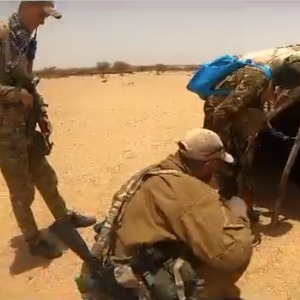By Aymen Jamli – Lotfi Jlassi stood facing Mecca beside the ambulance carrying the body of his brother, who died of Covid-19, and said a prayer — one of the few rites still allowed in Tunisia’s pared back funerals. In the North African country, hit hard by the pandemic, undertakers have adapted burials to protect mourners from infection while trying to help grieving families cope with the added pain of foregoing traditional funerals.
“The pain of separation is doubled,” said Jlassi, in tears as he laid his brother to rest at the Jellaz cemetery in the capital Tunis. “My brother Salah died without his daughter or wife being able to say goodbye.” Only four relatives were allowed to attend the burial, watching on as men wearing protective suits, gloves and face masks laid the body to rest in graves dug in the rocky ground. Before the pandemic, Salah’s body would have been interred by a large gathering of male friends and family, in the presence of an imam, and women would have bid their last farewell at home.
Around 8,000 people have died of Covid-19 across Tunisia, most since September, with Tunis recording over 20 fatalities per day recently. In the wooded hillside cemetery that overlooks the capital, some 2,000 people have been interred in a new section dedicated to Covid-19 victims.
Fresh graves have been dug as the death toll continues to rise. Covid-19 victims are now taken directly from the morgue to the cemetery, forgoing the family home where they normally would be washed and laid out in a shroud so relatives can say goodbye with a customary kiss on the forehead.
Usually the body would then be taken to the mosque for the Janaza funeral prayer, but this practice too has been stopped. “It’s difficult, unbearable,” said Jlassi back at his home, sitting among empty chairs meant for mourners.
‘We will never forget’
Outside the morgue at the city’s Charles Nicolle hospital, the odour of disinfectant penetrates the masks of relatives who have come to accompany the body of a family member who died from Covid-19 to the cemetery. Organising these burials is a “sensitive responsibility”, Mehdi Dellai, head of undertakers for the Tunis town hall, told AFP. Taking the deceased directly to the cemetery is “very difficult for their families”, he said. “We try to apply strict health protocols while being mindful of the difficult psychological state of the families.”
Early on in the pandemic, measures were particularly strict: only one family member could go to the cemetery with the body and had to keep a distance of at least 10 metres (about 30 feet). Some burials took place without any relatives present. Undertakers would instead take short videos with their mobile phones and send them to the bereaved families.
But with experience, Dellai said, undertakers are now better equipped to handle coronavirus burials and have become more flexible. Sometimes, the ambulance will agree to pass close the home of the deceased, so the family can have a semblance of a last goodbye.
But the restrictions and fear that isolate the grieving families remain “hard and painful”, Dellai said. Aya, 16, lost her father to Covid-19 four months ago. At the cemetery, she placed a few grains of wheat on his grave so that birds might visit his resting place. “Nobody came to offer their condolences, everyone preferred just to call,” said the teenager, dressed in black. “The pain of separation may ease, but we will never forget that we didn’t get to say goodbye.”












